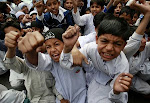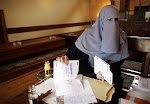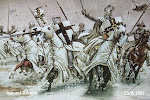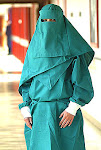 It is that time again. The ashura when the shia go out with their sharp toys and beat themselves bloody. You really have to love this party. They cut their heads with knives, swords and razor blades. They even will cut the heads of their babies all in the name of the martyr Hussain. It is a never ending bloodfest in the islamic world.
It is that time again. The ashura when the shia go out with their sharp toys and beat themselves bloody. You really have to love this party. They cut their heads with knives, swords and razor blades. They even will cut the heads of their babies all in the name of the martyr Hussain. It is a never ending bloodfest in the islamic world. Thousands of Shiites marched in Karbala, Iraq, on Tuesday to mark the Muslim holiday of Ashura. According to a report in Reuters, men "cut their scalps with daggers and whipped their backs with chains." Can a Shiite self-mutilate any way he wants?
In a sense. A subset of male Shiites injure themselves on Ashura to represent their grief over the martyrdom of Hussein, grandson of the prophet, at the hands of the Ummayad army in 680. These people engage in violent rituals such as pounding their chests with their fists, lacerating their scalps with a knife or machete, or self-flagellation with a zanjeer—five blades connected to a wooden handle by steel chain. But none of these forms of expression is sanctioned by mainstream religious authorities; most prominent Shiite clerics object to all forms of self-mutilation, since it has no basis in early religious history and appears barbaric to outsiders.
Annual processions mourning the death of Hussein became common in the eighth century, but self-mutilation did not become part of the ritual until the 15th century. A piece of apocrypha explains the practice: According to some, Hussein's sister Zainab, overcome with grief at the sight of her brother's severed head, banged her head bloody against her saddle post.
Not all Ashura mourning rituals are violent. The less painful traditions include prolific weeping, wearing black, reciting mournful poetry, passion plays, somber music concerts, and fasting. In South Asia, it is traditional to build an ornate casket and carry it to the sea.Ayatollah Khamenei of Iran issued a fatwa against self-mutilation in 1994, and Ayatollah Ali al-Sistani, Iraq's most prominent cleric, has issued statements suggesting ambivalence about the practice. Some flagellation enthusiasts rejected the pronouncements entirely or claimed they prohibited only the cutting of the scalp with swords. Others accepted the fatwa and redirected their efforts toward more socially productive acts like Ashura blood drives. Over time, most clerics have muted their criticism, as many Shiites' devotion to the practice has been too strong to break.






















No comments:
Post a Comment